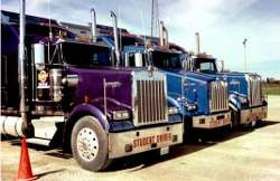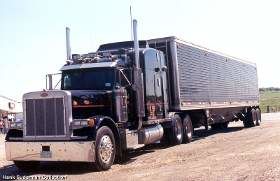Causes Of Shipment Delays
Topic 9039 | Page 1

This is, admittedly, a bit off-topic. I've never driven anything with more than four wheels. I'm not training to be a driver, but I do have a few questions about the industry.
I'm making software for delivery recipients that collects the hourly GPS logs from trucks and estimates when the delivery will arrive. The idea's to coordinate things better; we're trying to minimize wasted time drivers spend waiting at customers.
We have a solid algorithm - trucking is generally reliable - but we're having trouble predicting occasional delays. On, say, a 1- or 2- day run, what would delay a load on the scale of hours? We can get weather and traffic data, but what else is there? How could we predict delays? Any knowledge, experience, or recommendations would be greatly appreciated.
Also, how would drivers feel about software like this?
Oops! Didnt mean to submit without a comment. I think what your creating will be fabulous if its used for most deliveries. The waiting game is a common one in the industry. Often times communication between disbatch and driver is the issue. Disbatch says dont deliver until XYZ time and day and the driver may be there hours or a day or two in advance. Hence the waiting game begins. I hope to see your program in use in the very near future.
BMI:
Body mass index (BMI)
BMI is a formula that uses weight and height to estimate body fat. For most people, BMI provides a reasonable estimate of body fat. The BMI's biggest weakness is that it doesn't consider individual factors such as bone or muscle mass. BMI may:
- Underestimate body fat for older adults or other people with low muscle mass
- Overestimate body fat for people who are very muscular and physically fit
It's quite common, especially for men, to fall into the "overweight" category if you happen to be stronger than average. If you're pretty strong but in good shape then pay no attention.
Dm:
Dispatcher, Fleet Manager, Driver Manager
The primary person a driver communicates with at his/her company. A dispatcher can play many roles, depending on the company's structure. Dispatchers may assign freight, file requests for home time, relay messages between the driver and management, inform customer service of any delays, change appointment times, and report information to the load planners.
Besides the usual suspects weather and traffic the single biggest factor is waiting to load or unload.
This is a HUGE problem with those that use reefer trailers. Even if the driver does everything perfect, either the shipper or receiver, the waiting to get loaded or unloaded can be 2 hours in length up to 8 hours in length. The problem mainly lies at the customers feet and I am not sure you can make an algorithm that takes in account the wait time at a customers dock.
The reasons vary. Not enough product and waiting for the line to make more product. Or they(customers) ordered to many trucks at one time and don't have enough employees /docks to take care of the trucks when they arrive. Equipment failure in the plant which can take hours or days to fix if at all.
Shipper:
The customer who is shipping the freight. This is where the driver will pick up a load and then deliver it to the receiver or consignee.
Reefer:
A refrigerated trailer.
HOS:
Hours Of Service
HOS refers to the logbook hours of service regulations.
I feel like you're asking what can delay a shipment en route? If that's the case I'm assuming your algorithm is based off of the time of departure from the shipper , after everything is loaded and the driver is on the road, correct?
For me, the biggest source of delays is always traffic, which you're already accounting for. Are you incorporating a method for predicting what time a driver will be passing through a certain area and accounting for the anticipated traffic? Say the driver is expected to pass by Atlanta at 5:00pm, that will make a huge difference. Also, it might make sense to consider major events happening in the area such as sporting events or concerts. Construction also causes a lot of traffic delays.
The driver's own habits play a big role in determining ETA too. Some like to drive only 8 hours a day, while others like to max out the allowed 11. Some prefer daytime driving, others prefer driving at night. Some like to speed, others like to cruise at a slower pace. Some like to take long, frequent breaks, others like to stop infrequently and briefly.
This seems like a very complex problem with a lot of variables. What if there were a way to develop an algorithm that could learn a specific driver's habits and predict their ETAs accordingly? The predictions would be somewhat generalized at first, but would get more and more accurate over time...
Shipper:
The customer who is shipping the freight. This is where the driver will pick up a load and then deliver it to the receiver or consignee.
I'm making software for delivery recipients that collects the hourly GPS logs from trucks and estimates when the delivery will arrive
I think Billy's software is to help the receiving operation better plan for when the shipment will roll up to the guard shack. The receiving company can plan their Just-In-Time operation for when the goodies will be there.
In a trucker's dream this would include having a dock and unload crew ready for the trailer doors to swing open. But in any case, anything, including an Arrival app, should help us get unloaded that much quicker.

Errol's got it right: we're trying to figure out time in transit.
Do most drivers keep the same truck for different shipments? Keeping driving pattern records by truck might be doable.
Thanks for your input!
Over the road drivers generally live in their truck's sleeper. So truck numbers are a hint as to who's driving.
The Persian Conversion listed driver characteristics that may apply. Traffic and large events may be included in your estimation depending on how detailed you want your programming to get. You can get traffic data from various sources.
If a driver is not loaded/ unloaded in a set time (often 2 hours after the appointment time) they might get paid for the wait. This is called "detention" and the wait is usually blamed on the dock operation. If the truck can't get unloaded, the freight isn't counted as delivered.
Over The Road:
Over The Road
OTR driving normally means you'll be hauling freight to various customers throughout your company's hauling region. It often entails being gone from home for two to three weeks at a time.
Another variable to factor in is parking availability. Some parts of the country have limited truck parking, and open spaces get scarce as hen's teeth even as early as 2pm in some places, for instance the TA in North Bend, WA. As another example, I recently pulled a load from the Americold in Connell, WA to Phoenix. Thanks to delays at the shipper , I was only able to make it as far as Hermiston, OR that night. The next night, the farthest I could get legally along my assigned routing was Wells, NV, due to the lack of places to park along US-93. The next night, I had to stop in Kingman, AZ for the same reason. Both nights I ended up with a good 2+ hours on my clock, but the next acceptable place to stop was 3 or more hours further down the road. Factoring in how far a driver might be able to travel in one day along a given route based on not just hours, but also where he or she may have to stop within those hours, would also help.
Shipper:
The customer who is shipping the freight. This is where the driver will pick up a load and then deliver it to the receiver or consignee.
HOS:
Hours Of Service
HOS refers to the logbook hours of service regulations.Breakdowns of course will cause multi-hour delays.
Driver illness is another one.
Getting pulled into a DOT scalehouse for an inspection can cause delays of only a few minutes at best, and many hours at worst if say for instance a driver gets shutdown by the DOT and the load has to be transferred to another driver.
Considering the fact that driver turnover in the industry averages around 100% it would be statistically significant to say drivers will sometimes quit after being dispatched on a load. They may leave the load where it's at, they might take it home, they might take it to a terminal or truck stop - it's hard to say. But it could certainly cause a multi-hour delay during the shipment.
Even simple mistakes in the offices like typos in the delivery date or a load planner that accidentally did an override on an assignment and left an important load unassigned.
Terminal:
A facility where trucking companies operate out of, or their "home base" if you will. A lot of major companies have multiple terminals around the country which usually consist of the main office building, a drop lot for trailers, and sometimes a repair shop and wash facilities.
DOT:
Department Of Transportation
A department of the federal executive branch responsible for the national highways and for railroad and airline safety. It also manages Amtrak, the national railroad system, and the Coast Guard.
State and Federal DOT Officers are responsible for commercial vehicle enforcement. "The truck police" you could call them.

Another problem that would have to addressed is how many hours a driver has on his clock. Not only do the mentioned delays have a effect on your timeframe, they also can reek havoc on your DOT clock. If a driver has to make a mandatory unscheduled stop it has to be addressed
DOT:
Department Of Transportation
A department of the federal executive branch responsible for the national highways and for railroad and airline safety. It also manages Amtrak, the national railroad system, and the Coast Guard.
State and Federal DOT Officers are responsible for commercial vehicle enforcement. "The truck police" you could call them.
New Reply:
New! Check out our help videos for a better understanding of our forum features

















Preview:








 TT On Facebook
TT On Facebook
This is, admittedly, a bit off-topic. I've never driven anything with more than four wheels. I'm not training to be a driver, but I do have a few questions about the industry.
I'm making software for delivery recipients that collects the hourly GPS logs from trucks and estimates when the delivery will arrive. The idea's to coordinate things better; we're trying to minimize wasted time drivers spend waiting at customers.
We have a solid algorithm - trucking is generally reliable - but we're having trouble predicting occasional delays. On, say, a 1- or 2- day run, what would delay a load on the scale of hours? We can get weather and traffic data, but what else is there? How could we predict delays? Any knowledge, experience, or recommendations would be greatly appreciated.
Also, how would drivers feel about software like this?
Dm:
Dispatcher, Fleet Manager, Driver Manager
The primary person a driver communicates with at his/her company. A dispatcher can play many roles, depending on the company's structure. Dispatchers may assign freight, file requests for home time, relay messages between the driver and management, inform customer service of any delays, change appointment times, and report information to the load planners.